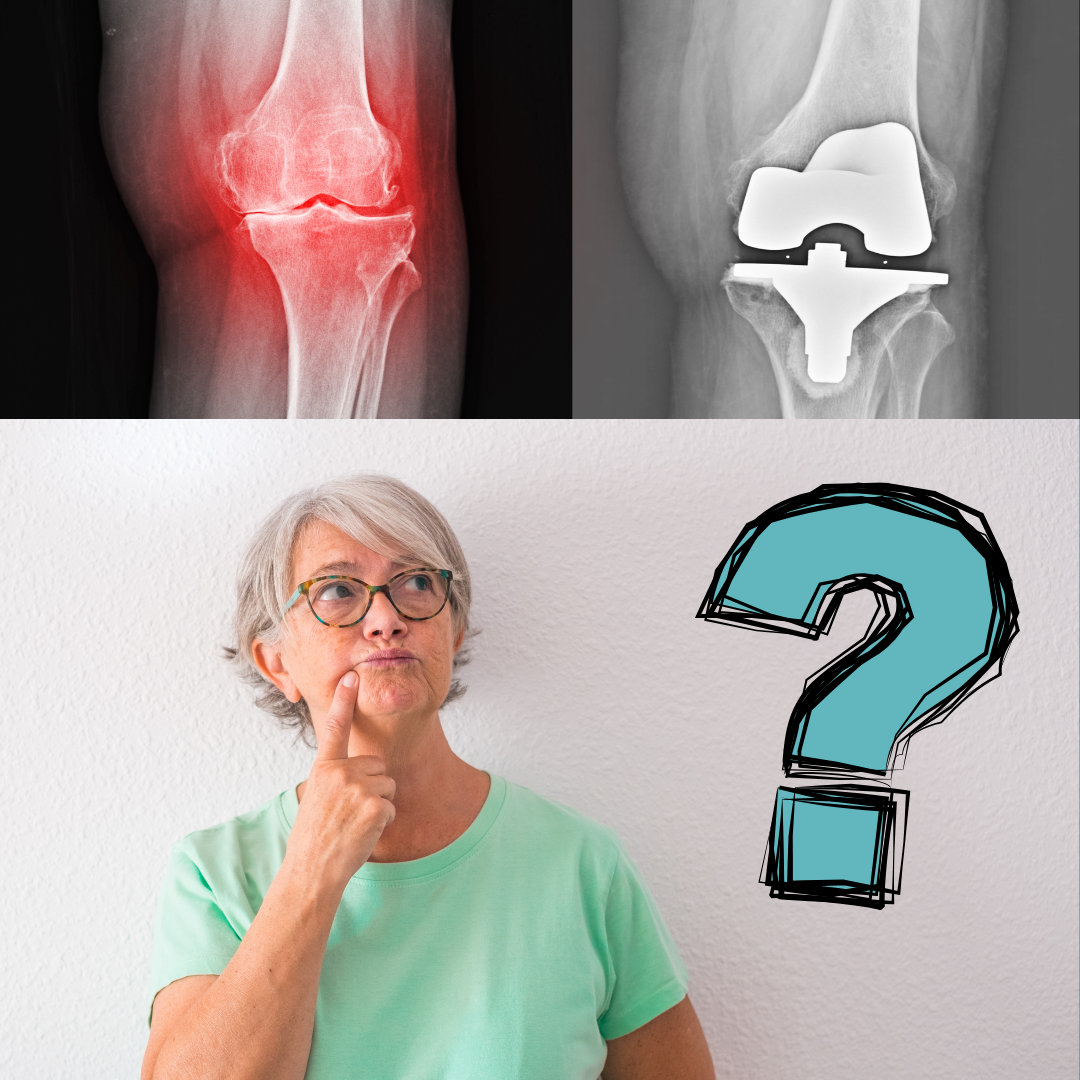Is It Time for a Knee Replacement?
If you suffer from arthritic knees, you know how painful and limiting it can be. Knee arthritis pain can interfere with your ability to walk, climb stairs, or even sleep. If your symptoms are severe and affecting your quality of life, you might be asking: Do I need a knee replacement? – It’s a question I get asked alot in clinic.
In this article, we’ll explore the top signs it might be time for knee surgery, and the best ways to manage knee pain if you’re not ready for an operation.
5 Signs You May Need a Knee Replacement
Knee replacement surgery is a significant decision. While it can be life-changing for many, it’s not always necessary. These are the most common signs that indicate you may be ready to consider a knee replacement:
1. Severe, Persistent Pain
If your knee pain is constant, interferes with your daily activities, or keeps you awake at night, it may be a sign of advanced arthritis. Pain at rest suggests significant joint damage and may warrant surgical evaluation.
2. Limited Mobility and Daily Struggles
Struggling to walk, go up and down stairs, or get out of a chair? If knee stiffness and pain are making basic activities difficult, it may be time to speak with a specialist.
3. Non-Surgical Treatments No Longer Help
If you’ve tried physiotherapy, medications, walking aids, or injections without significant relief, your options may be narrowing. Surgery is often considered when conservative treatments fail.
** Important – A lot of people may have tried a few exercises given to them on a sheet without a proper assessment – rarely do these work nor is this in my mind physiotherapy tried and did not help. People arrive in clinic having “tried” physio before and are amazed at the results they get from a targeted exercise and management program.
** Keen to explore this further? I would love you to join me on my FREE Arthritic Knee Masterclass. Here we look at how exercise if not done correctly can make pain worse. I share exercises to begin strengthening without aggravating. I teach you how to avoid and treat flare ups and so much more. FREE to join and requires approx 30 mins of your time. I would love to see you there. Click here to learn more and enrol.

4. Your X-Rays Show Severe Joint Damage
An x-ray showing bone-on-bone contact or advanced joint deterioration can confirm that arthritis has progressed to a surgical stage. Your doctor or physiotherapist can help interpret the results.
This blog maybe helpful Understanding Arthritic Knees Through X-rays and Images: What Do They Show?
5. Your Quality of Life Has Declined
Knee arthritis doesn’t just affect your body—it can impact your mood, independence, and overall wellbeing. If you’re avoiding outings, missing activities you love, or feeling isolated due to pain, it’s time to reassess.
Not Ready for Surgery? Here’s How to Manage Arthritic Knee Pain
If you’re not quite ready to pursue surgery, or you’re looking to delay a knee replacement, there are still effective ways to reduce pain and stay active.
1. Focus on Strengthening the Right Muscles
Strong thigh, glute, and calf muscles support your knee and take pressure off the joint. A physiotherapist can create a personalised plan that builds strength without aggravating your pain. This the the exact aim of my Online Arthritic Knee Treatment Program.
2. Lose Excess Weight
Carrying extra body weight adds strain to your knees, making arthritis symptoms worse. Even a small amount of weight loss can significantly reduce pain and improve function.
3. Use Support Aids
Walking sticks, or shoe inserts can reduce pressure on the joint and help you move with less pain. Ask your physio which aids are most suitable for you.
4. Try Low-Impact Exercise
Gentle movement helps keep the joint mobile and muscles strong. Great options include:
- Walking (with support if needed)
- Swimming or aqua aerobics
- Stationary cycling
- Tai chi or gentle yoga
5. Consider Injections and Other Interventions
Depending on your case, steroid injections or hyaluronic acid (viscosupplementation) may help reduce inflammation and provide temporary relief.
This blog may be helpful – Medical Treatments for Knee Arthritis: An Overview
Conclusion: Knee Replacement Is a Big Decision—But You’re Not Alone
Knee replacement for arthritis can be life-changing, but it’s not always the first or only option. If you’re dealing with severe knee pain, limited mobility, or ineffective treatment, it may be time to consider surgery. But if you’re not ready—or want to delay it—you can take action to reduce pain and preserve your independence.
Over the year of seeing this scenario time and time again in clinic this is what I have concluded – The people who are unsure about if they need a knee replacement know that they have not full embraced all of the other options. By working through a structure program with them one of 2 things happens.
- Their symptoms much improved and they realise that a knee replacement is not currently required.
- They do everything they can to improve their knee and they are still struggling. Then the decision suddenly becomes easy – as they know they have tried everything.
Hopefully you now have a much better idea of where you are heading. If I can help you at all then you know where I am and maybe I will see you on the FREE Masterclass.
Take care, Helen
Helen Manders BSc (Hons) MCSP HCPC
Chartered Physiotherapist
Treating Arthritic Knees Since 2001




